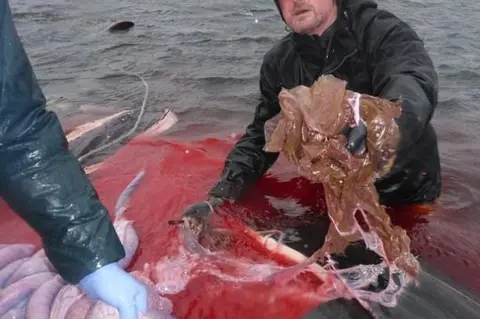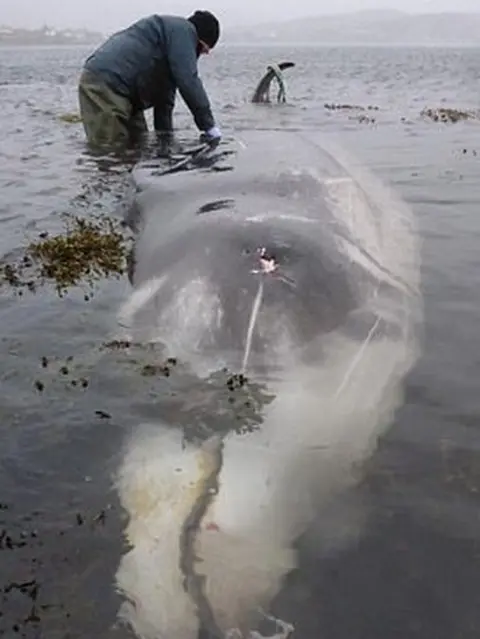Plastic bags found inside whale after stranding on Skye
 Scottish Marine Animal Stranding Scheme
Scottish Marine Animal Stranding SchemeScientists recovered four kilos of plastic bags from the stomach of a whale found stranded on Skye.
The Cuvier's beaked whale was put to sleep on welfare grounds after it got into difficulty near Broadford in December 2015.
The bags were found during a necropsy done the following day by the Scottish Marine Animal Stranding Scheme (SMASS).
A Sky Atlantic documentary later on Wednesday will show scientists uncovering large quantities of plastic.
Inverness-based SMASS undertakes post-mortem examinations on marine animals, such as whales, dolphins and basking sharks, to discover why they died.
 Scottish Marine Animal Stranding Scheme
Scottish Marine Animal Stranding SchemeThe 6m-long adult male Cuvier's beaked whale appeared to be in good condition externally.
However, when SMASS made their examination they found the bags and other plastic debris in every part of its stomach.
Internal damage to the whale included irritated and inflamed stomach and intestinal walls.
A spokesman for SMASS said: "These findings suggest the plastic impaction was very significant and likely very sore, causing the animal to drift into shallower waters and live strand.
"About a year later another Cuvier's beaked whale live stranded west of Bergen, in Norway. This animal was also found to have ingested a significant amount of plastic bags sufficient to form a space occupying mass in the stomach, preventing prey from being digested leading to starvation of the animal."
Cuvier's beaked whales are able to dive up to 3,000m deep for more than two hours, and are seldom found in shallow waters close to mainland shores.
SMASS was also involved in work that revealed last month that one of the UK's last killer whales was contaminated with "shocking" levels of a toxic chemical.
The animal, called Lulu, was found dead on the Isle of Tiree in the Inner Hebrides last year after becoming entangled in fishing lines.
Tests revealed her body contained among the highest levels of polychlorinated biphenyls, or PCBs, ever recorded.
The chemicals were banned from the 1970s but are still in the environment.
